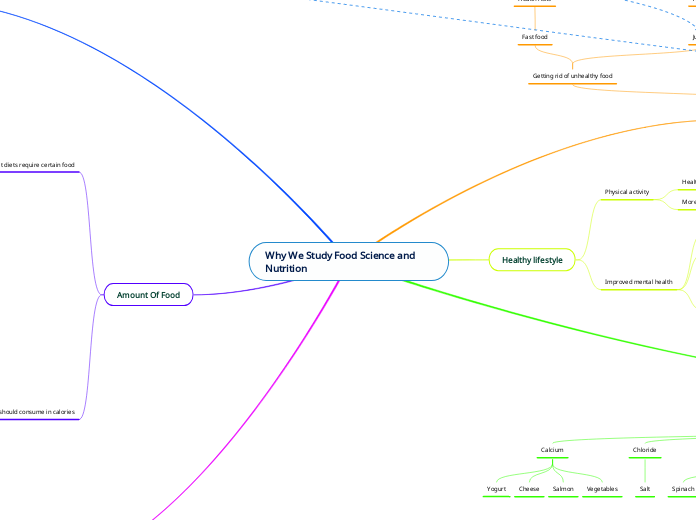Why We Study Food Science and Nutrition
Whats Good and Bad
Getting rid of unhealthy food
Fast food
Health risks
Heart problems
Digestive issues
Cancer
Increased risk of stroke
Obesity
Junk food
Addictive
Sugar is very addictive
Eating more of the healthy food
Fruits
Helps with energy
Vegetables
Reduces health risks
Strokes
Heart problems
Eye problems
Lowers blood pressure
Digestive problems
Blood sugar
Healthy lifestyle
Physical activity
Healthy body
Chance of longer life
More energy
Improved mental health
Improves sleeping
Easier time waking up
Improves focus
Improved mood
Better time interacting with others
More motivation
For work
For physical activity
For personal goals
What minerals you can get from food
Calcium
Yogurt
Cheese
Salmon
Vegetables
Chloride
Salt
Magnesium
Spinach
Broccoli
Legumes
Seeds
Whole-wheat bread
Potassium
Meat
Milk
Fruits
Vegetables
Grains
Legumes
Sodium
Salt
Soy sauce
Vegetables
Chlormium
Meat
Poultry
Fish
Nuts
Cheese
Copper
Shellfish
Nuts
Seeds
Whole-grain products
Beans
Prunes
Fluoride
Fish
Teas
Iodine
Iodized salt
Seafood
Iron
Red meat
Poultry
Eggs
Fruits
Green vegetables
fortified bread
Effects Caused By Food
Protein
Lean meats
Beef
Lamb
Veal
Pork
Kangaroo
Poultry
Chicken
Turkey
Duck
Emu
Goose
Bush bird
Fish and seafood
Fish
Prawns
Crab
Lobster
Mussels
Clams
Dairy products
Milk
Yogurt
Cheese
Eggs
Amount Of Food
What diets require certain food
Keto diet
Sea food
Eggs
Low-carb veggies
Eggs
Nuts
Plain yogurt
Plant based diet
Vegetables
Fruits
Nuts
Beans
Whole grains
Whats the regular amount you should consume in calories
Sedentary
Children 1500
Youth 2500
Adult 2350
Senior 2000
Low activity
Children 1750
Youth 2700
Adult 2600
Senior 2200
Active
Children 2000
Youth 3000
Adult 2900
Senior 2500
What vitamins you can get from food
B-1
Ham
Soymilk
Watermelon
Squash
B-2
Milk
Yogurt
Cheese
Grains
B-3
Meat
Poultry
Fish
Mushrooms
Potato
B-5
Chicken
Whole grains
Mushrooms
Potato
B-6
Meat
Fish
Poultry
Legumes
Tofu
Bananas
